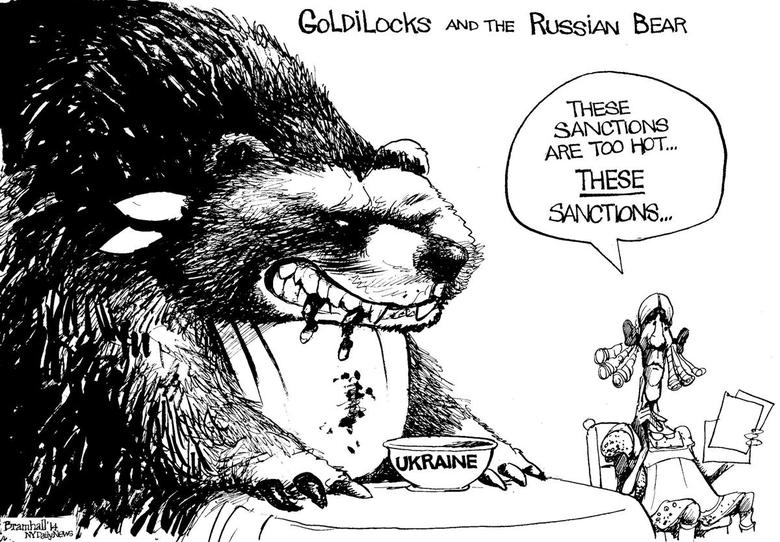
RUSSIA SANCTIONS: WAR PRICE

The European Union could significantly scale back sanctions and resume discussions with Russia on issues ranging from visa-free travel; cooperation with the Moscow-led Eurasian Economic Union; and the crisis in Libya, Syria and Iraq; if Russian President Vladimir Putin moves to end the crisis in eastern Ukraine, according to an EU discussion paper.
While insisting the EU can't return to "business as usual" with Moscow, the paper suggests the EU consider gradually normalizing many aspects of its ties with Russia in what would be a significant shift in relations.
It says the change would depend on Moscow fully implementing the peace and cease-fire deals it signed with Ukraine, standing by its gas-supply agreement with Ukraine and throwing no fresh wrenches in the way of the EU-Ukraine trade and political pact.
The paper, which hasn't yet been sent to member states, was prepared by the EU's foreign-policy arm ahead of a meeting of the bloc's foreign ministers in Brussels on Monday.
While the paper aims only to generate points for discussion, it is the first serious effort by EU officials to look at scaling back tensions and lay out some of the carrots to win Russian buy-in. The document largely reflects the thinking of those in the bloc who believe that this is a time to lean towards dialogue not further pressure.
No immediate decisions are expected from that meeting where the EU's medium-term approach to Russia is the main item on the agenda. EU energy chief Maros Sefcovic will visit Moscow on Wednesday for discussions with top officials from the government and the state gas company Gazprom .
The EU's ties with Russia have been stretched over the Ukraine crisis. While top-level dialogue has continued over Ukraine and on regional gas supplies, the EU cut off contacts with Russia on a range of trade, energy and security issues after Moscow annexed Crimea.
Despite divisions within the bloc, the EU imposed targeted individual and broad economic sanctions on Russia last year, one cause of the financial and economic downturn Russia has faced.
The EU and the U.S. accuse Russia of supporting and supplying pro-Russian rebels in eastern Ukraine, a charge Moscow denies.
However with some signs that the situation in eastern Ukraine could stabilize—or at least not deteriorate—there have been growing calls to seek ways out of the stalemate. Within days of taking office, European Commission President Jean-Claude Juncker met with Russian President Vladimir Putin at the Group of 20 leaders meeting in Brisbane, Australia. EU foreign policy chief Federica Mogherini has said that she will visit Moscow in early 2015 and insisted dialogue must be maintained.
The paper raises the question of whether the EU needs "a more proactive approach," including a series of possible trade-offs, to induce policy change from Russia.
"Such a process would need to be selective and gradual, and commensurate with the degree to which Russia responds positively," the paper said.
It warns however that, further thought should also be given to initiatives to strengthen the bloc's resilience to "further Russian pressure, intimidation and manipulation" in the energy, cybersecurity and aviation fields. The paper also urges reflection on how the EU should respond to Russia's funding of radical EU parties and its propaganda efforts.
One key idea floated is that EU sanctions on Russia be regrouped into those directly tied to the Crimea annexation and others that could be lifted if the situation in east Ukraine is normalized. The former would stay in place as long as Moscow kept control of Crimea, where the paper says "no change is expected in the short term." The paper says the "EU should be ready to scale down" the latter "as soon as Russia implements the Minsk agreements."
There is no mention in the paper that sanctions could be tightened if there is no improvement in the situation in eastern Ukraine.
The paper also says there could be increased cooperation with Russia in three main areas: foreign policy, trade and sectorial cooperation.
It suggests greater EU-Russia cooperation in the fight against Islamic State in Syria and Iraq, in policy coordination on Libya, Iran and the Middle East Peace Process.
The paper suggests that if Russia throws no fresh wrenches into the full implementation of the EU-Ukraine trade pact and takes steps to resolve outstanding trade disputes, the EU could consider establishment of formal relations with the Russian-dominated Eurasian Economic Union.
The paper also floats the gradual resumption of discussions on energy, environment and climate change issues. It suggests a partial resumption of discussions on an updated bilateral trade and political agreement focusing on rule-of-law cooperation and regulatory convergence.
It also suggests renewed talks on easier visa-free travel access for Russians if Moscow compromises on its new requirement for airlines to send detailed passenger data for flights into Russia.
Speaking in the European Parliament on Tuesday afternoon, European Council President Donald Tusk said EU leaders had decided in December that "the best thing for now is to stay the course" on sanctions.
"We will decide the next steps in March," he said.
The EU's three Russia-related sanctions laws will expire between March and July and require the approval of all 28 member states to be extended by a further year.
wsj.com



